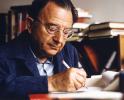Hannah Arendt on work and being human
Labour, work and action
The philosopher Hannah Arendt (1906-1975) has made many contributions to the philosophy of post-war 20th century Europe. But here we want to focus on one of her questions: What is it that makes us human? How does our humanity relate to the work we do every day? Is there work that promotes our humanity and work that degrades it? And how can we know one from the other?
Hannah Arendt says: If we look at the work people do, we can clearly identify three different types. These different types of work also have very different effects on our humanity.
First comes what she calls “labor.” Labor is work that we do in order to survive. Washing one’s clothes, for instance, or cooking, or shopping. If we look at labor, it quickly becomes clear that it never ends. You can slave all day just washing things, and shopping, and cooking, and cleaning the house, but the next day, or the next week, you’ll have to do the same chores all over again. Labor sustains life, but it does not produce any result beyond that. Nothing remains from the once clean house after it has become dirty again. And if you clean it again (as you must) a week later it will look dirty once more. Labor of this kind is hardly the stuff that elevates one’s human qualities. It is slaving away, like an animal does, and it bears no fruits in the long term besides survival.
Next comes “work.” We use the word sometimes to describe things, products: A work of art. Her life’s work. A writer’s collected works. Working is a process that culminates in a piece of work, an outcome, something tangible, something that will last. Working creates value beyond mere survival. Also, working creates a heritage. Something to pass on to the next generation. Ancient temples, churches, statues, pictures, books, songs, symphonies. The cultural heritage of mankind is the product of work.
“Are you working?” – “No, I’m laboring.” You get the point.
In our society, work is threatened by labor. A world that wants to consume things fast and cheap favors labor over work. Why make things permanent? Capitalism rewards the disposable. Buy a fridge and throw it away after the warranty expires. Buy a phone and throw it away after a new model comes out. Thus, the work of making a fridge, or phone, is degraded to labor, since the fruits of the work lose their permanence. For Hannah Arendt, permanence is the enemy of consumerism. In order to keep the economy going, work has to be changed into labor. Artists and craftsmen have to be changed back into being laborers, slaves who create disposable items in a never-ending cycle of production and destruction.
But despite their differences, both labor and work are rooted in the same need for survival. An architect who builds a house works no less from necessity than someone who just cleans that house as a laborer. Both are unfree, because they have no choice but to do what they are doing, be it labor or work. The work also has to fit other constraints: the publisher demands a particular kind of book. The museum wants that kind of artwork, and so on. Work is constrained by necessity. Freedom is expressed only in a third kind of activity, which Hannah Arendt calls “action.”
Action, for Arendt, is to begin something new. To create something, not as a matter of response to necessity, but just out of the wish to create new things and to put them into the world for all to see. Action is therefore an expression of one’s freedom. And because I am free to choose how to act, when I do choose one course of action, this choice expresses who I am: my own priorities and what is important to me. In this, Hannah Arendt is not so far removed from Erich Fromm, who makes a similar, crucial distinction between busy-ness and truly productive action.

A comprehensive overview of Erich Fromm’s philosophy of happiness. We discuss his life, his ideas and his main works, both in their historical context and how they are still relevant for us today.
Let us look around. As our world favors labor over work, it also offers fewer and fewer opportunities for free, creative action. Expressing one’s own creativity has become a luxury that only few can afford. Arendt looked back to Ancient Greece as the time when people were free to act and to publicly display their creativity and their choices. Today our choices are often dictated by custom, advertisements, laws, political correctness, or censorship.
We are about to lose what makes us human, Arendt says: our freedom to express ourselves. We are about to get used to being less than human, less than we should be. We are getting used to being a mass, a labor force, human resources, things.
Do we want to surrender without a fight?





